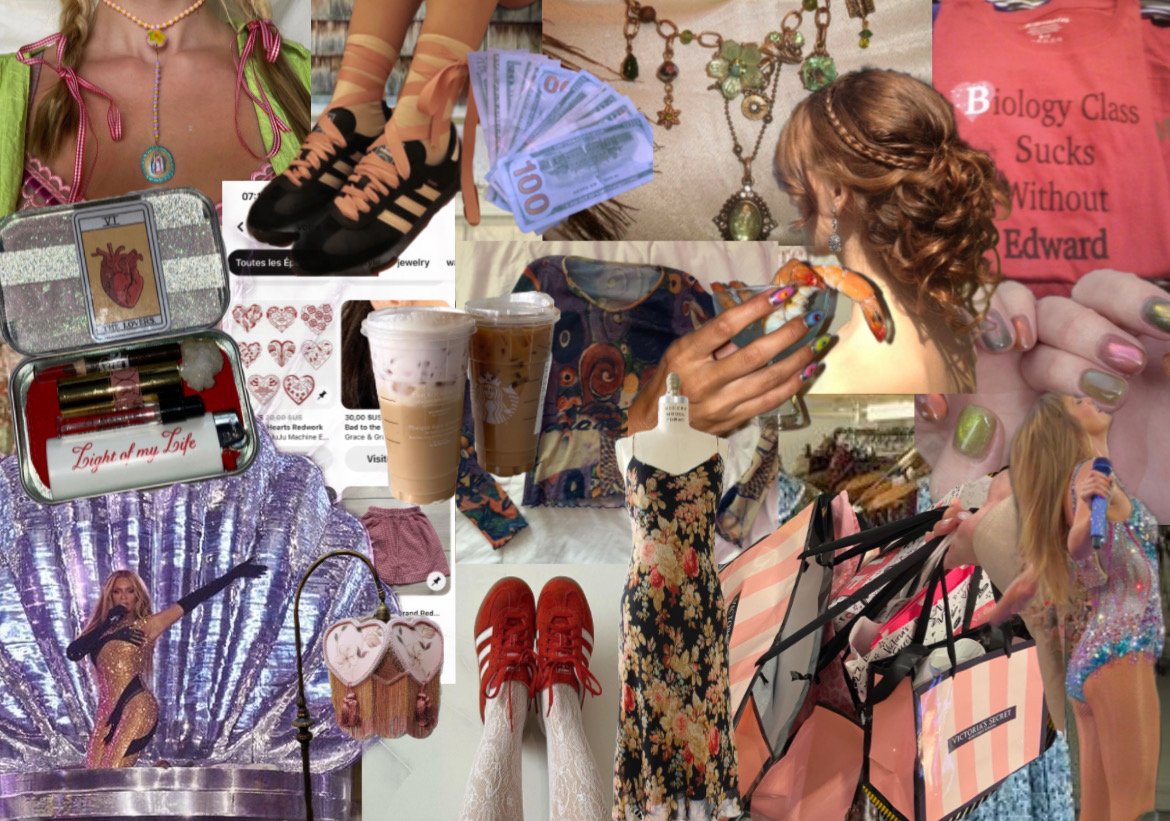Girls as Currency: How Girlhood Is Its Own Economy
Courtesy of Zoe Curtis
By ZOE CURTIS ‘25
It’s never been a better time to be a girl online. Girl dinner, girl math, that girl, clean girl, tomato girl, cinnamon girl, weird girl, girl everything, girl everywhere, girl all at once. “The girl is a living currency,” the anonymous collective Tiqqun wrote in their theory on being a girl in late capitalism. The money is everywhere, said Tiqqun, but it comes wrapped in a feminine aesthetic: Too Faced Better Than Sex mascara and overpriced loungewear sets, ribbon for lacing new Adidas Sambas and gingham Lisa Says Gah mini skirts. Money is everywhere, but at all times, there is a complex negotiation at play between people and things, markets and intimacy. The girl is a token, the place where people and products co-exist in a non-contradictory manner. She continually has to ask what she is worth but she is also asked to pretend that she is free.
When the question of what teenage girls are worth is posed, the answer is, ostensibly, a lot. The cosmetics industry was valued at nearly 300 billion dollars in 2022 and is currently projected to rise to roughly 420 billion by the year 2030. Taylor Swift and Beyoncé pumped around 4.3 and 4.5 billion dollars respectively into the American economy this year, effectively leading the efforts of post-recession recovery. Greta Gerwig’s “Barbie” is the highest-grossing movie of 2023, with close to 1.4 billion dollars in ticket sales alone. The girl economy is alive, maybe more than it has ever been, and girls, as consumers, have been pushed to the forefront of this growth.
Still, though, societal hatred towards teenage girls seems an inevitable sentiment. Subreddits exist solely to hate on Swifties, a self-denomination for fans of Taylor Swift, the majority of whom are manifestly teenage and female. Users of the same site, usually older and male, engage in forums where they discuss the apparent perversion of women wearing makeup, the undertones inherently reductive, and, to a point, misogynist. Shows marketed towards young girls are quick to be criticized and paraded about as “blatant examples of the awfulness of American television,” much more harshly than shows like “The Big Bang Theory,” which portray women in arguably worse and more chauvinistic ways for comedy, and whose faults are ignored by most reviewers.
In conversation, my friends often refer to TV as a “guilty pleasure.” It’s a mildly self-deprecating admittance that what they watch (Gilmore Girls, Twilight, and The Vampire Diaries as some examples) lacks intellectual currency, that it’s something to hide away in the dorm room with a plush pink blanket and a pint of Half-Baked, but the kicker is, it’s not. Low-quality TV is pushed towards teenage girls for consumption, on the diminutive assumption that we lack the complexity to enjoy anything of higher stimulus, and we, as prisoners of this societal judgment, eat it up.
Teenage girls are perhaps the most lucrative demographic in the market, and as we are wielded as tools for capitalism, we, in turn, wield our own economic power. Businesses make an entire sector out of marketing towards teenage girls for the cultural mavens that they are, especially as they grow into adults harnessing even greater spending power. It’s the type of power that made Kylie Jenner the Forbes-lauded “youngest self-made billionaire ever,” the influence that skyrocketed Alix Earle into paid brand partnerships with companies like Fashion Nova and Rare Beauty. It’s the type of power that turns Lisa Sahakian into a jewelry maverick with her eccentric company Ian Charms, the type of power that reinvigorates global usages in Tumblr and Pinterest and turns them into profitable opportunities for ad revenue, especially if those ads are for Dior Cherry Lip Oil or vintage labradorite necklaces on Etsy.
So, hate on teenage girls if you must, call us insipid and girly, ridicule us for wanting to dress up and watch Barbie or get our acrylics filled, for our scented candles and 17-step skincare routines, for liking Mia Goth in Pearl and using Ayesha Erotica TikTok audios, for being obsessed with Taylor Swift or Beyoncé, and for not knowing a singular song by Def Leppard when you ask about our t-shirt. The numbers speak for themselves. Teenage girls will remain economic powerhouses in all of their lip-glossed and moisturized glory: trend dictators and majority consumers, a coveted demographic with a complicated relationship to capitalism, but one that is surely worth a ton.

